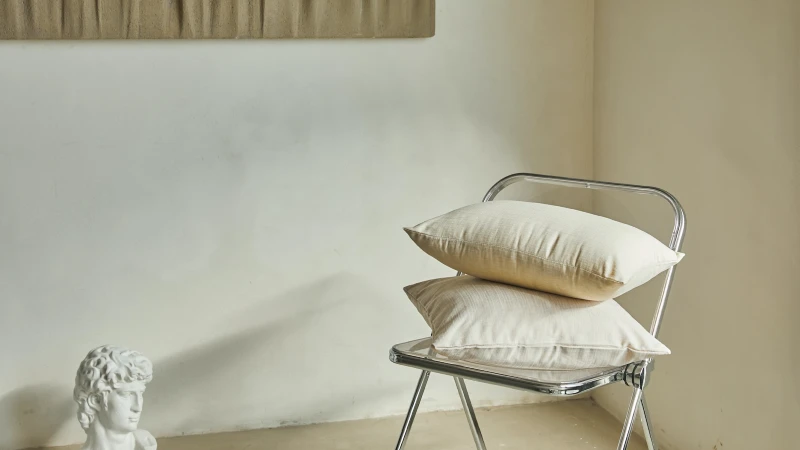Disclosure: This post may contain affiliate links, meaning we get a commission if you decide to make a purchase through our links, at no cost to you. Please read our disclosure for more info.
Tired of tossing and turning on a stained, saggy pillow? It’s time to transform your sleep experience with a pillow protector!
Say goodbye to grossness and hello to a restful night’s sleep. Discover the importance of using a pillow protector and its benefits to your sleep routine.
From keeping your pillow fresh and allergen-free to extending its lifespan, a pillow protector is a must-have for a healthier and more comfortable sleep environment.
Rest easy, knowing you’ve made the right choice for a better sleep experience.
In This Post:
Benefits of Keeping Pillows Fresh
To ensure your pillows stay fresh and clean, it’s essential to use a pillow protector. It keeps your pillows free from sweat, drool, and body oils and prevents fluids from seeping into the pillow, which can cause mold spores and clumping.
Additionally, a pillow protector can help control dust mite allergens by acting as a barrier and preventing shed skin cells from feeding them. Pillow protectors don’t prevent bed bugs, as they’re too large to live inside pillows and feed directly from biting people.
However, in case of an infestation, it’s easier to wash the pillow protector than the entire pillow. So, utilizing a pillow protector provides an additional layer of protection against bed bugs and ensures your pillows stay fresh and clean.
Controlling Dust Mite Allergens
Preventing dust mite allergens is crucial for maintaining a clean and healthy sleep environment. A pillow protector is an effective way to achieve this. Dust mites are microscopic pests that thrive in warm and humid environments. They feed on dead skin cells. These allergens can cause respiratory issues, such as sneezing, coughing, and wheezing, especially for those with allergies or asthma.
A pillow protector acts as a barrier, preventing dust mites from entering your pillow and reducing the accumulation of allergens. It’s important to choose a pillow protector made of impermeable fabric and a pore size of 5 microns or lower to block dust mite allergens effectively.
Dealing With Bed Bugs
When dealing with bed bugs, protecting your pillow is essential to prevent infestation and maintain a healthy sleep environment. While pillow protectors don’t prevent bed bugs, they offer an additional layer of protection against these pests.
Bed bugs are too big to live inside pillows and feed directly from biting people, not skin cell by-products. However, in case of infestation, it’s easier to wash pillow protectors than the entire pillow. The covers provide a barrier that can help keep bed bugs in the pillow, preventing infestations in the bedroom.
Difference Between Pillow Protectors and Pillow Covers
When understanding the difference between pillow protectors and pillow covers, it’s important to know the key distinctions in their functionality and purpose.
- Pillow covers keep the pillow clean and secured.
- Pillow protectors encase the pillow to keep dust, pet dander, and mites away.
- Pillow protectors make the pillow hypoallergenic.
- Some pillow protectors offer protection from bed bugs and liquids.
Pillow covers are primarily used to keep the pillow clean and protected from dirt, stains, and wear and tear. They’re usually made of decorative fabric and are removable for easy washing.
On the other hand, pillow protectors are designed to encase the entire pillow, providing an extra layer of protection against dust mites, allergens, and bed bugs. They often have specialized features, such as waterproof membranes or allergen-blocking fabrics, to enhance the pillow’s longevity and promote a healthier sleep environment.
Types of Protection Offered
Now, let’s delve into the different types of protection pillow protectors offer.
Pillow protectors provide various types of protection to ensure the longevity and cleanliness of your pillows.
Firstly, they offer wear and tear protection, preventing damage such as tears, holes, and fading, improving sleep and comfort.
Secondly, pillow protectors provide spill, sweat, and stain protection with their waterproof feature. This guards against spills, sweat, and stains, preventing moisture and liquids from soaking into the pillow. It’s beneficial for feathered or down-fill pillows, preventing unpleasant odor and damage to the fill.
Additionally, pillow protectors can offer allergen-free protection, preventing dust, dust mites, mold growth, and mildew inside the pillow. Some pillow protectors even provide bed bug protection, acting as a layer of security against pests and preventing infestation in the bedroom.
Lastly, pillow protectors designed specifically for feathered pillows protect against the loss of fill and keep the room clear of debris, preventing feathers from poking through and causing discomfort.
Using pillow protectors is essential as they reduce airborne dust particles, prevent the accumulation of allergens, offer easy cleaning, and contribute to a healthier sleep environment.
Importance of Using Pillow Protectors
Protect your pillows and ensure a healthier sleep environment by using pillow protectors. Here are four reasons why using pillow protectors is essential:
- Keeps your pillows clean and fresh: Pillow protectors prevent the accumulation of dust mites, bed bugs, oil, sweat, and other allergens, reducing the number of airborne dust particles in your bedroom.
- Extends the lifespan of your pillows: By offering easy cleaning and protection against wear and tear, pillow protectors help to maintain the quality and longevity of your pillows.
- Contributes to a healthier sleep environment: Pillow protectors create a barrier against allergens, ensuring you can sleep in a clean and hygienic space, free from potential irritants.
- Improves sleep patterns: With a cleaner and fresher sleep surface, pillow protectors can contribute to better sleep quality, allowing you to wake up feeling refreshed and rejuvenated.




